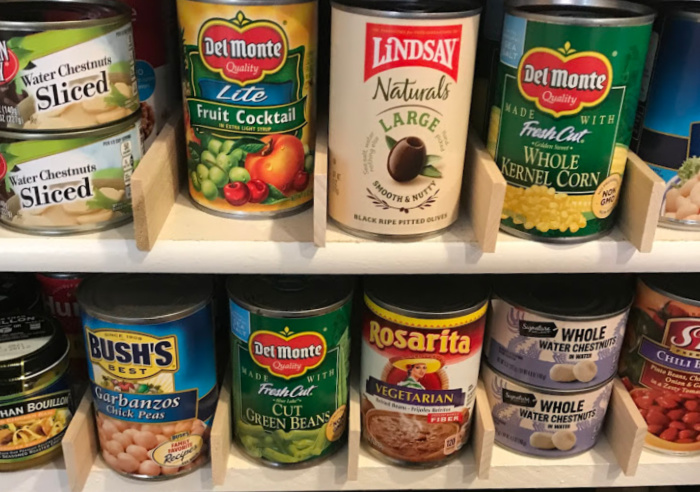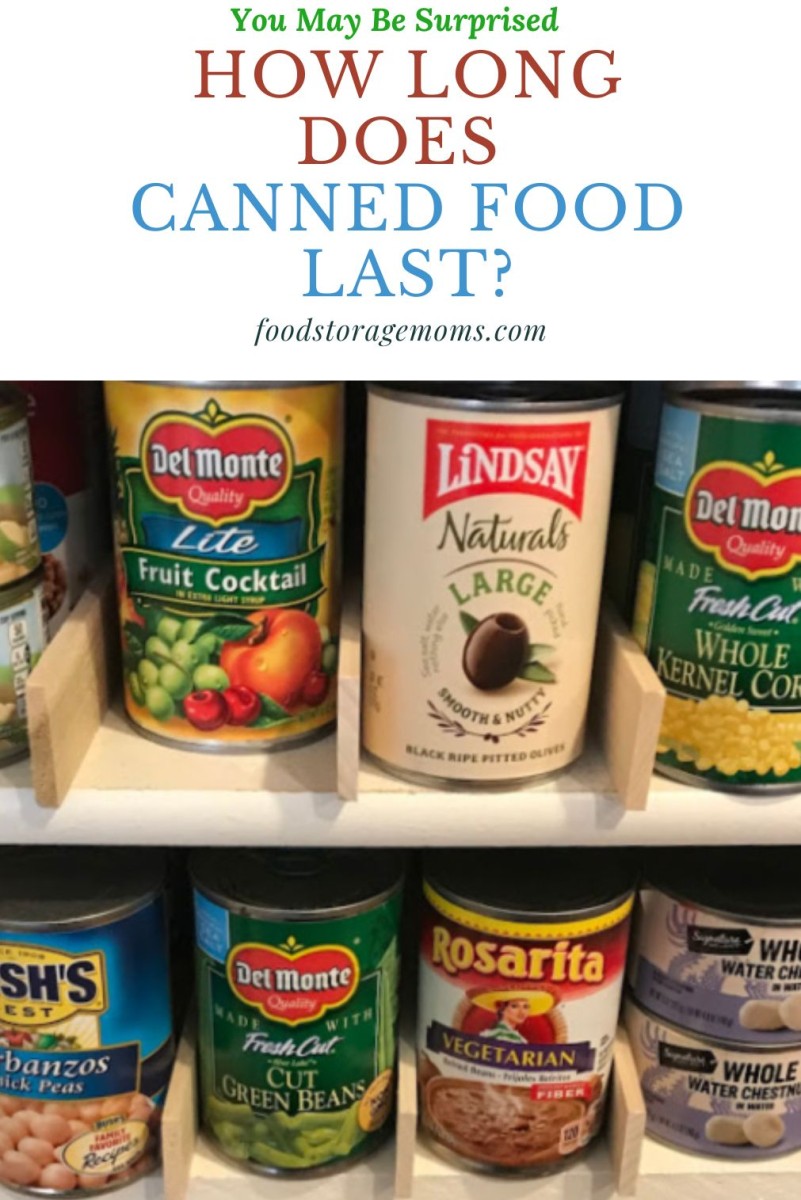
It’s wintertime again, and that means digging into your pantry for some warm hearty meals right out of a can. Whether that might be canned kidney beans to make a spicy chili, a small can of chicken noodle soup to warm you up, or a can of mixed vegetables to complete a meal. I’ve always found that canned foods are a quick solution to the wintertime blues. But when you’re checking out your food storage inventory, you might ask, how long do canned foods last?
When you pick up that can of kidney beans, you notice right away that they went out of date 6 months ago. Grrr! Do you throw it away and try to come up with another meal solution? I think most of us would be surprised at how much food spoilage each family experiences because they didn’t follow proper canned food rotation guidelines and use-by dates.
Storing your canned goods under optimum food storage conditions like a cool dry place such as a basement storage area is always a good idea. The challenge is, many of us don’t have a basement, or even a main floor area available for many canned goods or home-preserved food.
It may not be necessary to discard foods when they reach their use-by date in every case. So, why is there an expiration date on the label if it’s still safe to ingest? Let’s look at how long canned foods can last and understand when it’s still safe to consume them past their expiration dates.
How Long Does Canned Food Last?

What Does the Expiration Date Actually Mean?
When a consumer notices a can of soup in their food pantry that has gone past the expiration date, most often they think that it’s no longer safe to be eaten, and decide it should be thrown away.
This really isn’t the case. Truth is, the manufacturer that put the label on the can couldn’t tell for certain that the can of food that you’re holding in your hand will go bad on that exact day since there are so many variables. So what does that date mean?
Expiration dates don’t necessarily mean that canned food is no longer good, but that the color, texture, or flavor might not be what it once was within that expiration date period.
Vitamins and mineral levels might not be as high as they once were. The quality and nutritional value may not be as ideal, but it is still safe to consume. Expiration dates can generally be viewed as sell-by dates, and not as a timeframe for when food that’s gone bad. Sometimes the label will say: “best when used by…” which means what it says, it is at its best quality if used by that date.
Related: 10 Things You Can Do With Expired Food
Commercially Canned Foods
Commercially canned foods can be broken up into two categories, highly acidic and low acidic. Foods that are considered high-acid foods have shorter shelf lives, while low-acidic canned foods can be stored for a much longer period of time and are considered long shelf-life commodities.
High Acidic
Canned foods that contain high amounts of acid only have around a year to a year and a half of shelf life.
High-acidic foods that contain vinegar, pickles, and other pickled foods, salsa, canned tomatoes, tomato sauce, as well as canned fruit containing citrus juice, all fall under this category.
Low Acidic
Foods that are low in acid have a much longer shelf life. These are foods that are not tomato-based or citrus-based and cover a much wider range of canned foods.
Low-acidic food includes canned meats, canned fish, soups, and vegetables. On most of these cans, you will notice that the USDA recommends its shelf life right around 2 to 5 years.
If you properly store your canned foods, they can last even longer than that. There are many cases where properly stored canned foods can extend the life of the food for several years, and we’ll get to them in a second.
Low-acidic canned foods are excellent emergency foods to stock up on. Just make sure you come up with a rotation system, bringing the older cans to the front and using them first.
Home Food Preservation Canned Food
There’s a general rule in determining how long homemade canned food is good. It’s best to eat homemade canned foods within a year of canning them.
Consuming it long after a year should still be safe, but the quality and taste of your favorite homemade jams, jellies, peaches, pears, and salsa won’t be as fresh or leave you as satisfied. Of course, following the proper procedures when canning at home is vital and should give you confidence that the vacuum seal on those jars of food has been completed as needed.
True Stories About Expired Canned Foods
Back in 2002, several cans of canned bread were discovered that had survived World War II. One of the cans was opened and inspected, only to discover that the bread was still safe and quite edible. That’s after going 50 years past the expiration date!
There was a British couple that got married back in 1956. One of the gifts that they received was a can of chicken.
The man decided that they would wait until their 50th wedding anniversary before he opened it to eat the chicken. When 2004 rolled around, true to his word, he opened the container of chicken and ate it. And no, he didn’t get sick with food poisoning.
There have even been reports of shipwrecks from a hundred years ago that had canned food on board. Even after that much time had gone by, the food was still edible, and only lost a minimal amount of its original nutrients. Yes, it’s hard to imagine!
Determining Whether Expired Canned Food Is Safe
Examine the Can
Looking at the outside of an expired can of food can sometimes help you determine if that food is safe to eat or not.
If you notice that the expired can of food is bloated, bulging, or swollen, you shouldn’t eat it. Is there any rust or dents in the can that may have compromised the can’s interior lining? If the can has signs of the contents leaking some liquid, that’s another prompt that the food inside isn’t safe and should be discarded.
Again, throw it away. While you may think it’s just a dent or small leak, it actually increases the likelihood that bacteria may have begun growing inside the can. Better safe than sorry, please discard it.
Open the Can
If there was nothing noticeably “off” about the can, go ahead and open it and observe the contents. Do you notice an odor, any discoloration, or lower levels of fluid within the container?
It’s also a sign that if the food or fluid spurts out at you, it may no longer be safe to eat. But if you’re still on edge about eating it, like we’ve always heard, “when in doubt, throw it out.”
One additional caution, don’t think it will be ok to eat if you put it in a pot to boil on your stove. Yes, much of the bacteria can be killed through the boiling process, but who knows if it’s totally safe? I wouldn’t take the chance, your health is more important than a can or two of food that’s questionable!
How long does canned food last after being opened?
Whether the food was purchased in a jar or can, or you picked it up fresh from the market, once exposed to the air and light it starts to break down. Any unused portions should be put in a container and stored in the refrigerator or freezer. The type of food it is will determine how long you can store it there, it could be days, or in the case of the freezer, weeks or months.
I try to store my “leftovers” in airtight containers even in the fridge. I’ve found foods tend to last longer when stored that way.
Are pressure canners a good option when doing home canning?
Over the years I’ve done more water bath canning than pressure canning. The key is determining the acidic level of the food to be canned and then choosing the proper method.
If the food to be canned is considered a low-acid food then you need to use a pressure canner. Foods in this category would be most stews, and meats, including poultry and seafood, corn, beans, beans, and potatoes.
On the other hand, foods that are deemed to be high-acid foods would be canned using the water bath method. These foods would be things like most fruits and berries, tomatoes, and pickled foods like vegetables. Note that most varieties of tomatoes are now less acidic than in years past, so you need to add acidity by using lemon juice, some kinds of vinegar, or other citric acid types.
Final Word
Hopefully, this helped answer many questions or concerns that you had about whether you’ll be safe to eat expired canned foods. As you’ve discovered in some of these stories, canned foods can last a long time.
What have you done in the past when you noticed an expired can of food in your pantry? Did you throw it out, or decide to give it a try? Do you know how long canned foods last? I hope this post answered most of your questions. If not, make a comment below and I’ll try to get the answer you need. May God Bless this world, Linda.
The post How Long Does Canned Food Last? appeared first on Food Storage Moms.
